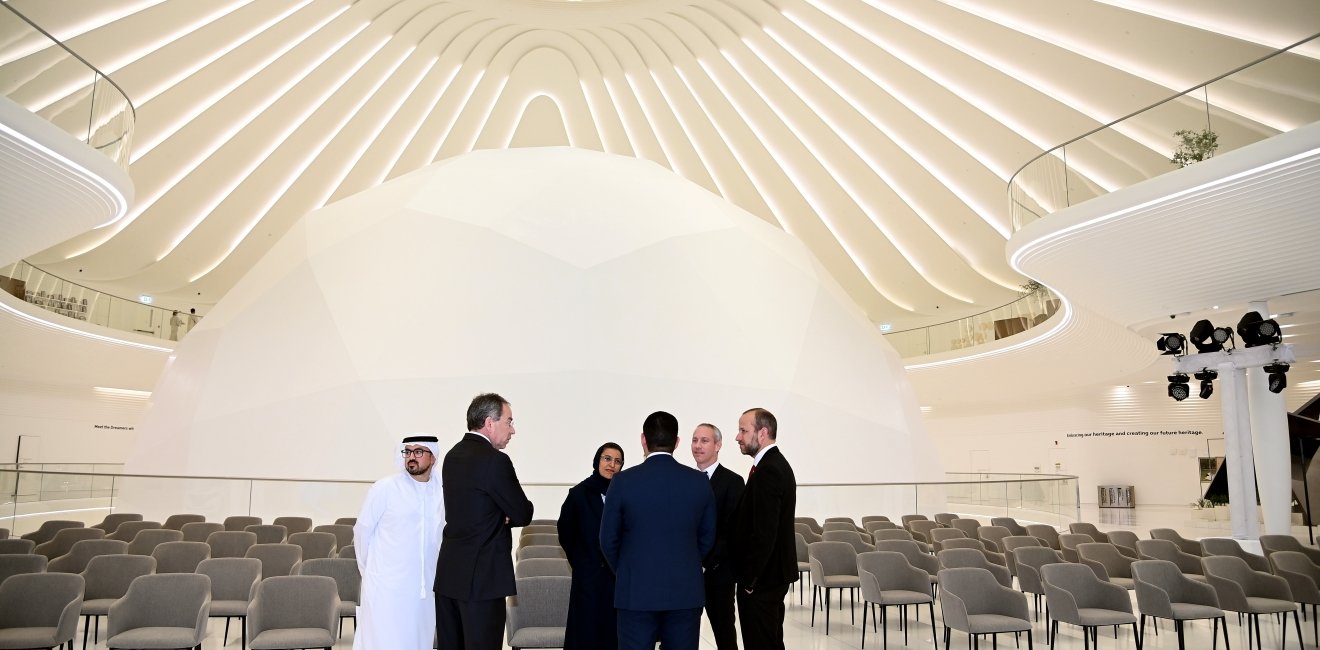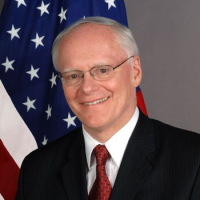The Abraham Accords process between Israel and several Arab states, which was sponsored by the Trump administration, then endorsed by President Biden, has run into two challenges simultaneously. First is the Chinese-brokered Saudi Arabia-Iran diplomatic rapprochement, and second, Israel’s hardline approach to Palestinians in the West Bank and Jerusalem. The latter was criticized by Arab states including the United Arab Emirates, the first Arab signatory to the accords, as well as Washington. The Accords will survive both, given underlying benefits and regional realities, but the turbulence generated by these developments will slow further progress (particularly the critical inclusion of Saudi Arabia) and require more American diplomatic engagement.
The “Abraham Accords” is a useful, if imprecise, term which defines the following: (1) a set of bilateral diplomatic initiatives between Israel and Arab states the UAE, Bahrain, Morocco, and less-developed, Sudan, midwifed by the Trump administration; (2) a larger set of arrangements, relationships and understandings including in economic, energy, foreign trade and military security sectors between the above states and the United States. This extends to Saudi Arabia, long term Israel Arab diplomatic partners Jordan and Egypt, and even India (through the I2U2 framework between India, Israel, UAE and United States) and potentially Indonesia and East Asia; (3) the underlying political, diplomatic, security, economic, and technological factors which have brought all these countries together.
The underlying landscape
[Israel's] military prowess, capacity to challenge Iran, high-tech economy, and cutting-edge energy and environmental progress make it a natural partner rather than an enemy state.
Understanding the current turbulence begin with the last. Arab state leaders and Israel have increasingly come to the conclusion that their future security and prosperity rests on regional relationships that complement hub-and-spoke security alliances with Washington. This is needed particularly to deal with regional threats such as Iran, Islamic terrorism, possibly Russia, and potentially new aggressive actors, at a time when Washington is shifting focus towards China and Ukraine and urging regional partners to do more “in the lead” themselves. Second, they have learned that security must be complemented by economic and technological growth beyond hydrocarbon exports for trade clout and military capabilities, as well as domestic calm. Finally, Arab leaders believe that Israel can be an important partner in all these areas. Its military prowess, capacity to challenge Iran, high-tech economy, and cutting-edge energy and environmental progress make it a natural partner rather than an enemy state. (For decades Arab leaders have understood that Israel, whatever its policies towards Palestinians, the Golan, and Lebanese border areas, is not interested in expanding into or occupying Arab states.)
These leaders know that Israel’s policies towards the Palestinians render it objectionable to their populations, but given other, greater threats, and the failure of the 2011 Arab Uprisings, most leaders do not fear their populations taking to the streets over Israel, a change from longstanding regional dynamics as recent as the 2006 Lebanon war. Israel, for its part, understands the economic and security benefits of closer Arab ties, long a fundamental, if seldom achieved, tenet of its foreign policy. Finally, both sides hope closer Arab-Israeli relations will either help resolve Palestinian issues (some Israelis and Arab states, as seen in the UAE insistence in 2020 that Israel give up annexation plans), or render them less urgent (other Israelis).
The unrest in Jerusalem, West Bank, and potentially inside Israel and in Gaza in response to hardline policies carried out by the new Netanyahu-led government has brought these latter assumptions into doubt. On February 20, the UN Security Council issued a tough presidential statement criticizing Israeli actions against the Palestinians. That statement was pushed by the US as an alternative to an even stronger, and legally binding, resolution condemning Israel. Notably, the UAE, the most active Abraham Accords Arab state, and increasingly a major Israeli trading partner, pushed the resolution. Soon thereafter, a Jordanian-organized high-level meeting in Aqaba including Palestinian, Egyptian, Israeli and US officials attempted to defuse the situation, producing a five-party written joint communiqué with Israeli-Palestinian commitments to uphold all prior bilateral agreements, de-escalate tensions, maintain the historic status quo at the holy sites in Jerusalem, and for Israel to stop discussion of new settlement units. However, a few hours later, the settler-launched violence in Huwwara appeared to scuttle the communiqué’s substance, as Prime Minister Benjamin Netanyahu distanced himself from the document.
China enters the scene
The second bombshell was the announcement that Saudi Arabia and Iran would move towards diplomatic relations in a deal brokered by China. This is not a policy revolution but has received deservedly much attention and has several important angles. Its significance is arguably less about Iran-Saudi rapprochement than China’s regional ambitions and the parlous state of US-Saudi relations. Restoring embassies is a superficial technical step reversing a Saudi decision to close its embassy in Teheran after a mob attacked it in 2016. But the Saudis and Iranians have been enemies for almost forty years and having active embassies played no role in mitigating that enmity. The two also have been meeting periodically for two years without demonstrable results. One possible exception is progress on the Yemen war. Supposedly, Iran is ending—at least temporarily—weapons supplies to its local ally, the Houthi rebels. The Houthis have suffered military reverses while the Saudis, pushed by Washington, have been seeking an out.
...China has neither the military projection capability to guarantee Iranian or Saudi security nor seemingly the political intent to instrumentalize trade to effect changes in Riyadh’s and Teheran’s core policies...
Nevertheless, skepticism remains of any real substantive rapprochement between Saudi Arabia and Iran. An example of such rapprochement is the amazing South Korean-Japan initiative brokered by the United States. That reflects readiness by both sides’ governments, business sectors, civil societies, political classes, thus as a whole, to make hard decisions and accept painful compromises. Both are also under the shadow of the same external threat—China. For now, there is little apparent willingness from either the Saudi or Iranian side to make such tough decisions, and the security shadows covering both are largely a function of Iran’s expansionist agenda in the Arab world and Saudi Arabia’s attempted containment of it. Absent a truly major change in either party’s worldview, this “rapprochement” resembles more US-Soviet Cold War security agreements to regulate, not transcend, underlying enmity. Likewise, China has neither the military projection capability to guarantee Iranian or Saudi security nor seemingly the political intent to instrumentalize trade to effect changes in Riyadh’s and Teheran’s core policies, as the United States often attempts to do around the world. So far, China’s efforts resemble the EU’s engagement in the region: exploiting strong trade relations and considerable diplomatic clout to achieve formalistic diplomatic steps, such as the initial Iran nuclear negotiations, without the hard power or will to secure major breakthroughs.
Still in the game
So, if China is the winner who is the loser? At first blush, it is the United States, and secondly, Israel. Riyadh’s move signals not just its disappointment with Biden’s Middle East and Iran-containment policies (at times the Saudis were also unhappy with Trump’s Iran containment), but anger at what the palace apparently sees as President Biden’s disdain and the anti-Saudi sentiments among the Democratic Party in Congress.
Ironically, the Saudi-Iran news broke only a day after the Saudis relayed their asks of Washington in return for warming with Israel.
But the United States remains in the game. Ironically, the Saudi-Iran news broke only a day after the Saudis relayed their asks of Washington (all directly or indirectly security related) in return for warming with Israel. Riyadh also just announced a huge Boeing commercial aircraft purchase. More generally, the US security presence in the region is expansive and irreplaceable. It is slowing Iran’s nuclear weapon program, leading regional efforts against Iranian-generated missile, rocket, and drone threats, dismantling the Islamic State, and curbing Russian ambitions. Furthermore, it maintains almost 40,000 troops in the region stationed in Turkey, Israel, and 10 Arab states; add to that an almost $10 billion annual security assistance budget and many tens of billions in arms sales.
Nevertheless, Washington’s talk of prioritizing other areas has spooked America’s partners. The remedy, however, is not more aircraft carriers but more diplomatic engagement, telephonic and in-person contacts, clarity of intentions and suppression of secondary American hobby horses which bedevil relations with always imperfect regional states. This is a question of diplomatic bandwidth and decisiveness, which an administration on its game can generate. In fact, the Biden administration displayed just that in dealing with Israel’s Palestinian policies in the Security Council and at Aqaba. Beyond the Palestinian issue, more of this, including a holistic approach to Iran’s myriad challenges, will buttress the Abraham Accords. That will give Israelis, Palestinians and Arab states positive expectations about cooperation, thereby generating leverage to keep each of them from undercutting the overall project.
The views expressed in these articles are those of the author and do not reflect an official position of the Wilson Center.








